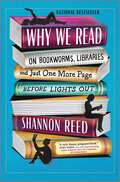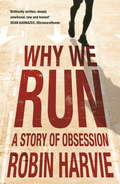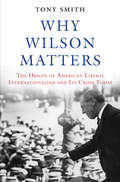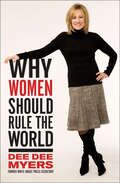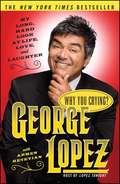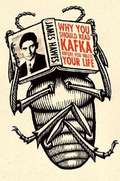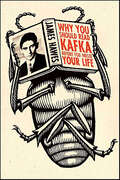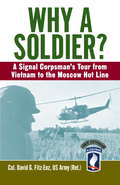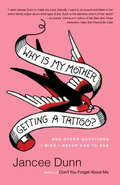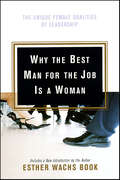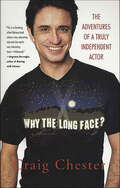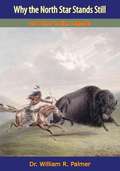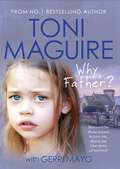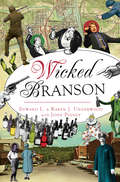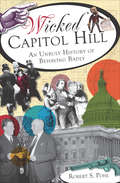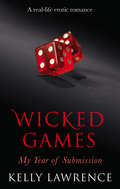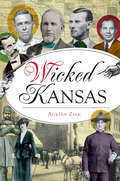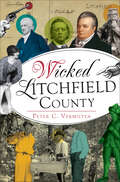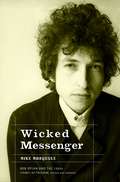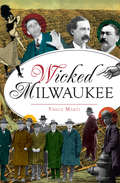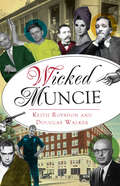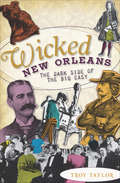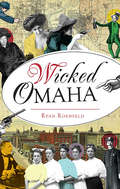- Table View
- List View
Why We Read: On Bookworms, Libraries, and Just One More Page Before Lights Out
by Shannon Reed*NATIONAL BESTSELLER**A Good Housekeeping Reads pick*A hilarious and incisive exploration of the joys of reading from a "beloved and wonderful writer" (George Saunders), teacher, bibliophile, and Thurber Prize SemifinalistWe read to escape, to learn, to find love, to feel seen. We read to encounter new worlds, to discover new recipes, to find connection across difference, or simply to pass a rainy afternoon. No matter the reason, books have the power to keep us safe, to challenge us, and perhaps most importantly, to make us more fully human.Shannon Reed, a longtime teacher, lifelong reader, and New Yorker contributor, gets it. With one simple goal in mind, she makes the case that we should read for pleasure above all else. In this whip-smart, laugh-out-loud-funny collection, Reed shares surprising stories from her life as a reader and the poignant ways in which books have impacted her students. From the varied novels she cherishes (Gone Girl, Their Eyes Were Watching God) to the ones she didn&’t (Tess of the d&’Urbervilles), Reed takes us on a rollicking tour through the comforting world of literature, celebrating the books we love, the readers who love them, and the ways in which literature can transform us for the better.
Why We Run: A Story of Obsession
by Robin HarvieEveryone can run. It is the simplest of sports, requiring only a pair of trainers and the open road. Its simplicity is part of its beauty. But why do we do it? Obsessive amateur runner Robin Harvie wants to understand what makes him run mile after mile, venturing far from home into remote places, and into the solitude of his own mind, pushing himself to the limit and beyond. Is it to break out of the clutter of his everyday life, into a freedom in which he has only himself to rely upon? Is it to affirm his own will, conquering his fatigue? Is it a fundamental instinct, inseparable from what it is to be human? In examining the lure of long-distance running, Robin speaks to famous runners, explores the literature of running and recounts his own experiences. His feats of running culminate in an effort to run the Spartathlon, retracing the 150 mile journey from Athens to Sparta made by Philippides in 490BC.Part memoir, part meditation, Why We Run is a compelling, rich and haunting account of what it is that makes us take to the road and learn what we are made of.
Why We Run: Why We Run
by Robin HarvieEveryone can run. Whether it is a jog around the park on a Sunday morning, or lining up with 40,000 other people at the start of the London Marathon, all it requires is a pair of trainers and the open road. But where does that road lead and why do we run at all? Robin Harvie ran his first marathon after a bet, but it wasn’t until he had ventured 6,000 miles into the extreme world of ultra-distance running to the start line of the oldest and toughest footrace on earth, that he found an answer. As a hobby turned into a 120-mile-a-week obsession, so a way out of his daily routine evolved into a journey to discover who he was and what he was really made of. Through the scorching heat of the desert and into the darkest hours of the morning, Why We Run reveals the beating heart of the brutal and profoundly intoxicating experience of running. If you have ever wondered what makes you lace up your trainers, and why you keep coming back for more, this is your story too.
Why Wilson Matters: The Origin of American Liberal Internationalism and Its Crisis Today
by Tony SmithThe liberal internationalist tradition is credited with America’s greatest triumphs as a world power—and also its biggest failures. Beginning in the 1940s, imbued with the spirit of Woodrow Wilson’s efforts at the League of Nations to “make the world safe for democracy,” the United States steered a course in world affairs that would eventually win the Cold War. Yet in the 1990s, Wilsonianism turned imperialist, contributing directly to the invasion of Iraq in 2003 and the continued failures of American foreign policy.Why Wilson Matters explains how the liberal internationalist community can regain a sense of identity and purpose following the betrayal of Wilson’s vision by the brash “neo-Wilsonianism” being pursued today. Drawing on Wilson’s original writings and speeches, Tony Smith traces how his thinking about America’s role in the world evolved in the years leading up to and during his presidency, and how the Wilsonian tradition went on to influence American foreign policy in the decades that followed—for good and for ill. He traces the tradition’s evolution from its “classic” era with Wilson, to its “hegemonic” stage during the Cold War, to its “imperialist” phase today. Smith calls for an end to reckless forms of U.S. foreign intervention, and a return to the prudence and “eternal vigilance” of Wilson’s own time.Why Wilson Matters renews hope that the United States might again become effectively liberal by returning to the sense of realism that Wilson espoused, one where the promotion of democracy around the world is balanced by the understanding that such efforts are not likely to come quickly and without costs.
Why Women Should Rule the World: A Memoir
by Dee Dee MyersIf women ruled the world, politics would be more collegial, businesses would be more productive, and communities would be healthier. More women should lead—not because they are the same as men, but precisely because they are different. Reflecting on her own tenure as White House press secretary and her work as a political analyst, media commentator, and former consultant to NBC's The West Wing, Dee Dee Myers blends memoir and social history with a call to action, as she assesses the crucial but long-ignored strengths that female leaders bring to the table. With intelligence, courage, candor, and wit, she looks at the obstacles women must overcome and the traps they must avoid on the path to success, and she challenges us to imagine a not-too-distant future with more women standing tall in the top ranks of politics, business, science, and academia.
Why You Crying?
by George Lopez Armen KeteyianIn this eagerly awaited autobiography, comedian and prime-time television star George Lopez tells the heartbreaking yet humorous story of his inspirational rise from dead-end kid in the Valley to giving a command performance before the president of the United States. It is a rare story that touches us so deeply with its humor, sadness, and powerful message that it transcends the walls of race, culture, and class that divide us. Why You Crying? is just such a story. Abandoned by his migrant-worker father at the tender age of two months, deserted by a wild, mixed-up mother at the age of ten years, Lopez grew up angry, alone, teased, and tormented in California's San Fernando Valley, raised by grandparents who viewed love as a four-letter word. Inspired by his idols, Freddie Prinze Sr. and Richard Pryor, Lopez sets out on a tumultuous twenty-year journey into the manic world of stand-up comedy -- trying to learn a skill nobody can teach; scoring one night and bombing the next; fighting anger, alcohol, depression, and doubt all while battling the barriers built to keep Chicanos from breaking through, especially on network TV. Today, the George Lopez show is a prime-time hit on ABC and his sold-out stand-up performances attract thousands of fans of all ages, each drawn to the sidesplitting riffs mined from a life so sad it had to be funny. Why You Crying? takes an outsider from the San Fernando Valley to Warner Bros. studios to inside the Emmys to plush Pebble Beach and all the way to the halls of Harvard. Along the way it's pure G. Lo -- raw, real, and, ultimately, uplifting.
Why You Should Read Kafka Before You Waste Your Life
by James HawesEverybody knows the face of Franz Kafka, whether they have read any of his works or not. And that brooding face carries instant images: bleak and threatening visions of an inescapable bureaucracy, nightmarish transformations, uncanny predictions of the Holocaust. But while Kafkaâs genius is beyond question, the image of a mysterious, sickly, shadowy figure who was scarcely known in his own lifetime bears no resemblance to the historical reality. Franz Kafka was a popular and well-connected millionaire's son who enjoyed good-time girls, brothels, and expensive porn, who landed a highly desirable state job that pulled in at least $90,000 a year in today's dollars for a six-hour day, who remained a loyal member of Prague's German-speaking Imperial elite right to the end, and whose work was backed by a powerful literary clique. Here are some of the prevalent Kafka myths: *Kafka was the archetypal genius neglected in his lifetime. *Kafka was lonely. *Kafka was stuck in a dead-end job, struggling to find time to write. *Kafka was tormented by fear of sex.
Why You Should Read Kafka Before You Waste Your Life
by James HawesEverybody knows the face of Franz Kafka, whether they have read any of his works or not. And that brooding face carries instant images: bleak and threatening visions of an inescapable bureaucracy, nightmarish transformations, uncanny predictions of the Holocaust. But while Kafka's genius is beyond question, the image of a mysterious, sickly, shadowy figure who was scarcely known in his own lifetime bears no resemblance to the historical reality. Franz Kafka was a popular and well-connected millionaire's son who enjoyed good-time girls, brothels, and expensive porn, who landed a highly desirable state job that pulled in at least $90,000 a year in today's dollars for a six-hour day, who remained a loyal member of Prague's German-speaking Imperial elite right to the end, and whose work was backed by a powerful literary clique.Here are some of the prevalent Kafka myths:*Kafka was the archetypal genius neglected in his lifetime.*Kafka was lonely.*Kafka was stuck in a dead-end job, struggling to find time to write. *Kafka was tormented by fear of sex.*Kafka was unbendingly honest about himself to the women in his life – too honest.*Kafka had a terrible, domineering father who had no understanding of his son's needs.*Kafka's style is mysterious and opaque.*Kafka takes us into bizarre worlds. James Hawes wants to tear down the critical walls which generations of gatekeepers---scholars, biographers, and tourist guides---have built up around Franz Kafka, giving us back the real man and the real significance of his splendid works. And he'll take no prisoners in the process.
Why a Soldier? A Signal Corpsman's Tour from Vietnam to the Moscow Hot Line
by David Fitz-EnzHe was one of the best, Airborne, proud to serve his country and fight its toughest war--in the hell that was Vietnam. Known to all as "Fitz," Signal Corps officer David Fitz-Enz served two tours in Vietnam. He was a soldier, combat photographer, and platoon leader, fighting America's cruelest war--from the VC-infested rice paddies of the Mekong Delta to the dreaded Ia Drang Valley, where the enemy ruled the night. Dispensing with traditional, sluggish chains of command, the Signal Corps developed a rapid-response system based on greater flexibility, cutting-edge communications technology, and interdependence between the branches of the military during the war. Now commanders in the field were able to call in artillery, air strikes, and reinforcements at a moment's notice. Fitz-Enz himself orchestrated the first-ever hook up over tactical systems between the President in the Oval Office and a general in the Vietnam jungle. The only book of its kind, WHY A SOLDIER? gives us the inside view of the Corps as it launched an exciting new era in strategic and tactical communications that set the groundwork for all future military operations.
Why is My Mother Getting a Tattoo?: And Other Questions I Wish I Never Had to Ask
by Jancee DunnDespite her forty years and a successful career as a rock journalist, Jancee Dunn still feels like a teenager, especially around her parents and sisters. Looking around, Dunn realizes that she's not alone in this regression: Her friends, all with successful jobs, marriages, and families of their own, still feel like kids around their moms and dads, too. That gets Dunn to thinking: Do we ever really grow up? Why Is My Mother Getting a Tattoo? explores this phenomenon-through both Dunn's coming to grips with getting older and her folks' attempts to turn back the clock. In a series of hilarious and heartwarming essays, Dunn conspires with her sisters to finagle their way into the old family homestead, dissects the whys and wherefores of her parents' obsession with newspaper clippings, confronts the seamy side of the JC Penney catalogs she paged through as a kid, and accompanies her sixtysomething mother to a New Jersey tattoo parlor, where Mom is giddy to get a raven inked onto her wrist. And Dunn does it all with humor and insight.
Why the Best Man for the Job Is a Woman: The Unique Female Qualities of Leadership
by Esther Wachs BookPlaying With The Big Boys -- And Beating Them At Their Own Game!From Meg Whitman of eBay to Marcy Carsey of Carsey-Warner and Oxygen Media, today's leading businesswomen show how to make it in the notorious boys' club of corporate America.Gone are the days when men called the shots. More and more women have replaced men or excelled over rivals in male-dominated industries because they possess the qualities of leadership that top firms are seeking today. Esther Wachs Book introduces the new Female Leader and reveals the seven key, and uniquely female, qualities of leadership that are turning the world around -- and allowing more women to achieve success.Filled with compelling insights gleaned from the country's highest-ranking businesswomen, Why the Best Man for the Job Is a Woman reveals how these exceptional women have soared to the top and captures their strategies for success.
Why the Long Face?: The Adventures of a Truly Independent Actor
by Craig ChesterCraig Chester's witty and wry observations on his life and those who have occupied it come together to create this funny, sentimental, yet irreverent collection of essays. From the backroads of Texas to the boardrooms of Hollywood, Craig Chester is unabashedly honest about the pain and the unique rewards of remaining an outsider in an insider's world.While his family prepares to watch the apocalypse from their rooftop with a bucket of KFC, Craig is trying to climb the social ladder at school by saving his neighbors from their sinful ways and speaking in tongues (with not-so-successful results). Along the way Craig experiences gender confusion at grade-school summer camp and has massive reconstructive surgery to correct his deformed teenage face, only to emerge and realize that Hollywood success isn't always measured in externals, but also in the machinations of the heart and how much you don't show. All along he expertly captures the feeling of what it's like to not always fit in—and have that be okay—with a comic timing that's tuned in to the heart and soul of trying to get by day to day.His tales of life, from growing up in the Bible Belt to starring in nine films, prove that the average American life is anything but normal.
Why the North Star Stands Still, and other Indian Legends
by Dr William R. PalmerNo one knows how old the charming legends in this unusual book really are. By word of mouth they have been handed down from generation to generation among the Pahute Indians, one of the most ancient and primitive tribes on this continent, who settled centuries ago in what is now the state of Utah.In the main, the legends tell of the origin of all living things—which to the Indian includes the trees, the flowers and grass, the wind, the water, the moving clouds that suddenly darken into storm over the mountains, as well as man and the animals of this earth. They also tell why living things behave as they do.Here, for example, is the Pahute version of why the sun rises cautiously, why the coyote looks up when he howls, how the beaver lost the hair on his tail, how the flowers got their colors, and of many more interesting phenomena. In language of great beauty and simplicity the stories explain how the Pahute gods, Tobats and his younger brother Shinob, created the earth and ruled all its inhabitants.The author, William R. Palmer, who was taken into the tribe as a token of gratitude for his work in securing better living conditions for the dwindling number of Pahutes in Utah today, listened to the legends as they are still related around Pahute campfires. At last (and only after his Indian brothers were certain he would not misinterpret them) he obtained their permission to translate the stories into English and so to make a book of them.Here then is a rare collection in which young and old alike are sure to find hours of enjoyment. This book makes a significant contribution to that all-too-scant segment of our literature—the folk tales of the first Americans.For this and other historical contributions Dr. Palmer was given the highest recognition of an honorary doctorate degree by Utah State University.
Why, Father?
by Toni Maguire Gerri MayoBetrayed by Those Meant to Love Her, This is Gerri Mayo’s True Story of Survival For fans of Cathy Glass and #1 bestselling author Toni Maguire comes a true story of abuse and survival Toni Maguire is the author of twelve books sold over 1.5 million worldwide, including her own bestselling memoirs Don't Tell Mummy and When Daddy Comes Home. Telling her own story encouraged others who had kept their childhood secrets hidden to approach her. Now she writes for those who need a voice too. Gerri Mayo was only a young girl when she was first abused by her father. Growing up in a small village in Northern Ireland, in the tumultuous time of the Troubles, she had no one to turn to. He father’s evil acts were followed by abuse from her local priest, arranged by her father. After her mother found out about the abuse, and believing there was nothing she could do to help her child, she committed suicide. Gerri and her siblings were split up and placed in different foster homes. The children knew they were unlikely to see each other ever again. Told that her mother had committed a grave sin, Gerri’s foster parents were far from kind to her. She experienced years of loneliness, feeling completely abandoned.The abuse Gerry experienced was so extensive it required an operation to repair the damage to her body. When asked who or what had been responsible, she responded “the priest”. But she was not believed in her small Northern Ireland town in the 1960s, where everyone believed a priest took his orders directly from God. After finally meeting her kind and caring husband a few years ago, and after celebrating her 60th birthday, Gerry decided it was time for her story to be told. This is her true story of survival. If you’re a fan of Cathy Glass and books like Tears of the Silenced, If You Tell, or Spilled Milk, you will want to read Toni Maquire’s Why, Father?
Wicked Branson (Wicked)
by Karen J. Underwood Edward L. Underwood Johnny PinneyBranson's wholesome brand of entertainment made it the nation's destination for family fun, but the vacation wonderland can't claim a spotless past. Murder and mischief dogged the town's efforts at respectability from the very beginning. The founder's own brother, Galba Branson, was a prominent member of the notorious vigilante gang the Bald Knobbers. He died in a picnic shootout that originated in a church prank. Branson's transformation into a showbiz mecca brought quarrel and scandal in its wake, from provoked orangutans to wire-tapped dressing rooms. Three comedians and authors--Ed and Karen Underwood and John Pinney--offer this backstage pass to the seamier side of Branson's history.
Wicked Capitol Hill: An Unruly History of Behaving Badly (Wicked Ser.)
by Robert S. Pohl&“Chronicles some of Capitol Hill&’s most legendary scandals, ranging from duels to murder to sex&” (Roll Call). Local historian and Walking Shtick tour guide Robert S. Pohl brings us Wicked Capitol Hill. Pohl includes such historic crimes as the affair between the congressman and the Capitol Hill cobbler&’s daughter that ended in murder at the hands of the press. Tales range from the backrooms of Congress and the docks of the Naval Yard to the bars of 8th Street and the grave of an infamous madam buried at the Congressional Cemetery. Pohl balances the tales between those of government officials misbehaving on the Hill and of truly local crimes. Includes photos!
Wicked Games
by Kelly Lawrence‘Looking back, I think I knew I was in trouble the first time I met him. The road he took me down was at once both more liberating than I could have dreamed of, and yet more intense than I could cope with. If the path of love doesn’t always run smooth ... then how much more crooked it becomes when mixed with raw desire.’This is no novel, but the memoir of an intense, exciting and at times unsettling relationship. Alex, for all his charms, is no billionaire playboy, and Kelly is no blushing virgin; rather your typical, overworked teacher who has no time for games, certainly not the wicked games he leads her into. Games that she ends up craving like a drug…
Wicked Kansas (Wicked)
by Adrian ZinkKansans like to think of their state as a land of industrious, law-abiding and friendly people, and for the most part they are correct. But its history has many tales of murders, cons, extrajudicial killings and other crimes. Its restive frontier attracted menacing characters, such as a cowboy who murdered a man for snoring, the serial-killing Bender family and the train-robbing James-Younger Gang. Although the area was eventually settled, the scandals did not cease. Learn about how a quack doctor nearly won the governorship, a decommissioned nuclear missile silo housed the largest LSD manufacturing operation in American history and more. Author Adrian Zink explores the salacious side of Kansas history in these wild and degenerate stories.
Wicked Litchfield County (Wicked)
by Peter C. VermilyeaThieves, rumrunners and rapscallions all color the unsavory side of Litchfield County history. Townspeople accused women of witchcraft simply for not bearing enough children in the early days of the region. During the eighteenth and nineteenth centuries, Owen Sullivan and William Stuart took advantage of the county's isolated stretches and a currency shortage to build counterfeiting empires. In 1780, Barnett Davenport's brutal actions earned him infamy as the nation's first mass murderer. Small-time speakeasies slowly took hold, and the omnipresence of alcohol-fueled crime led to the birth of the nationwide prohibition movement. Local historian Peter C. Vermilyea explores these and other devilish tales from the seedier history of Litchfield County.
Wicked Messenger: Bob Dylan and the 1960s
by Mike MarquseeBob Dylan's abrupt abandonment of overtly political songwriting in the mid-1960s caused an uproar among critics and fans. In Wicked Messenger, acclaimed cultural-political commentator Mike Marqusee advances the new thesis that Dylan did not drop politics from his songs but changed the manner of his critique to address the changing political and cultural climate and, more importantly, his own evolving aesthetic. Wicked Messenger is also a riveting political history of the United States in the 1960s. Tracing the development of the decade's political and cultural dissent movements, Marqusee shows how their twists and turns were anticipated in the poetic aesthetic--anarchic, unaccountable, contradictory, punk-- of Dylan's mid-sixties albums, as well as in his recent artistic ventures in Chronicles, Vol. I and Masked and Anonymous. Dylan's anguished, self-obsessed, prickly artistic evolution, Marqusee asserts, was a deeply creative response to a deeply disturbing situation. "He can no longer tell the story straight," Marqusee concludes, "because any story told straight is a false one."
Wicked Milwaukee (Wicked)
by Yance MartiThe Cream City of yesteryear was a dingy haven for scofflaws and villains. Red-light districts peppered downtown's landscape, but none had the enduring allure of River Street, where Kitty Williams and Mary Kingsley operated high-class brothels. Chinese opium dens flourished in the backrooms of laundries. The demise of the Whiskey Ring brought down local distillers in a nationwide scandal that nearly reached the Oval Office. As a result, Police Chief John Janssen and the Committee to Investigate White Slavery and Kindred Vice waged a protracted battle to contain the most brazen offenses. Local historian and founder of OldMilwaukee.net Yance Marti uncovers the rough and rowdy blackguards who once made Milwaukee infamous.
Wicked Muncie (Wicked)
by Douglas Walker Keith RoysdonMuncie is the classic small American city. But for much of the past two centuries, the city fell victim to murder, corruption and the bizarre. Mayor Rollin Bunch went to prison for mail fraud, while his police commissioner faced a murder rap. Viola "Babe" Swartz ran a brothel out of a truck stop that was raided by police at least a dozen times but ran for sheriff in the 1974 primary election. June Holland, of the locally famous Holland triplets, killed her neighbor for refusing to sell her house. Authors Keith Roysdon and Douglas Walker explore the notorious and unusual side of Muncie's history.
Wicked New Orleans: The Dark Side of the Big Easy (Wicked Ser.)
by Troy TaylorThe author of Haunted New Orleans digs up NOLA&’s long and lawless history—from pirates and prostitutes to mobsters and murderers. Since as early as the 1700s, New Orleans has been a city filled with sin and vice. Those first pioneering citizens of the Big Easy were thieves, vagabonds, and criminals of all kinds. By the time Louisiana fell under American control, New Orleans had become a city of debauchery and corruption camouflaged by decadence. It was also considered one of the country&’s most dangerous cities, with a reputation of crime and loose morals. Rampant gambling and prostitution were the norm in nineteenth-century New Orleans, and over one-third of today&’s French Quarter was considered a hotbed of sin. Tales in this volume include that of the notorious Axeman who plagued the streets of the Crescent City in the early 1900s and Kate Townsend, a prostitute who was murdered by her own lover, a man who later was awarded her inheritance. Troy Taylor takes a look back at New Orleans&’s early wicked days and historic crimes. Includes photos
Wicked Northern Illinois: The Dark Side of the Prairie State (Wicked)
by Troy TaylorFrom the secrets of Joliet Penitentiary to the ferocious gunfights between the Ku Klux Klan and the Shelton Gang, Troy Taylor takes the measure of the dishonest sweat and innocent blood poured into the prairies of Northern Illinois. Meet the "fallen angels" of Decatur's red-light district, the Springfield counterfeiters who bungled stealing Lincoln's bones and the Aurora man who propped up his porch with the heads of his wife and brother-in-law. And if you dare, eavesdrop on the chilling confession of a man who left a dancer's corpse to the mercy of the railroad tracks: "So, I pat them on the cheek, call them sweet names, and kill them."
Wicked Omaha (Wicked)
by Ryan RoenfeldIn old Omaha, the scent of opium wafted through saloon doors, while prostitutes openly solicited customers. When the St. Elmo theater ran short of the usual entertainment, the residents could always fall back on robbing strangers. Tenants of the Burnt District squirmed under the extorting thumb of a furniture dealer dubbed the Man-Landlady. The games of chance and confidence and outright municipal graft all played a part in a wicked city where gambler Tom Dennison ran politics and Madam Anna Wilson drove philanthropy. Join Ryan Roenfeld for a stroll along the seamier side of Omaha’s past.
